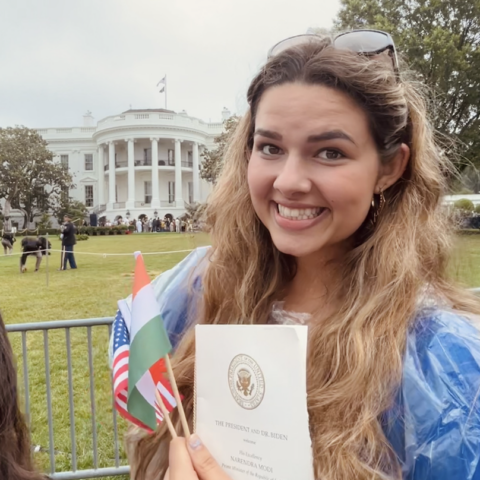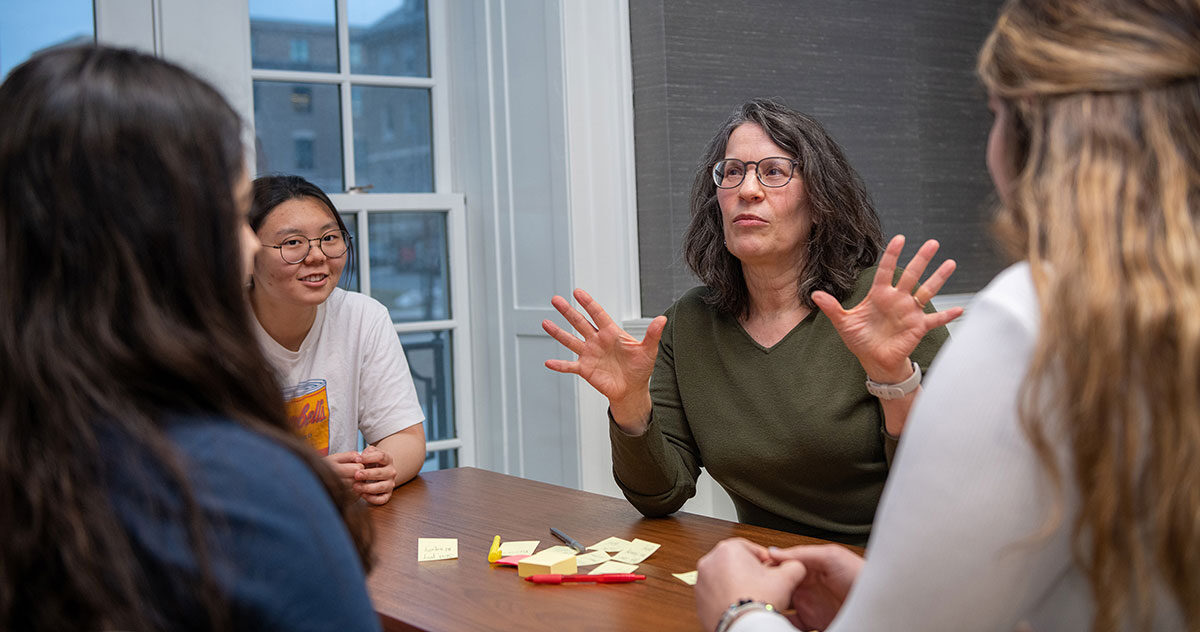Putting theory into practice in the public, private, and non-profit sector
Why studying public policy is important
Public policy affects every aspect of our lives, from the prices of the goods we buy to the decisions we make about where to live, work, and go to school.
By majoring in Public Policy you will apply an interdisciplinary social science curriculum that focuses on policy analysis and public affairs, ranging from the processes of making, implementing, and evaluating government policies to the ethical evaluation of contemporary social problems.
Sample Courses
In the coming decades machine intelligence will transform the economy, society, and global politics. This course will study these processes and the political challenges to the development of beneficial AI. Topics will include problems in AI safety; effects on- and of inequality and technological unemployment; the strategic and tactical impacts of autonomous weapons, cyberweapons, and AI-enabled intelligence operations; global institutions for providing global public goods, the legitimate aggregation of preferences, and the beneficial governance of AI development.
This course focuses on environmental legislation such as the National Environmental Policy Act (NEPA), the Clean Air Act (CAA), the Clean Water Act (CWA), and others as a foundation for US environmental policy. Internationally, focus on Environmental Policy in multiple countries and comparative to US environmental policy. Over the course we will discuss how environmental policy directly impacts community, public health, natural ecological systems, concepts of justice, and socioeconomics. We will explore these major environmental policies in the US as a basis of comparison and then apply those mechanism domestically or internationally to address climate change and improve other environment conditions. Students who seek to work in the US will build an analytic skill set to be competitive for jobs in environmental consulting, government, public policy, public health, non-profits, and advocacy groups.
The pressing issues of our time—from climate change to national security, from immigration to policing, from global economic development to domestic voting rights—are deeply intertwined with public policy decisions made by governments. In this course, we consider how societal conditions come to be defined as problems for governments to solve, the role of public and private actors in influencing policy processes, and how we know whether policies achieve their goals. Course readings, lectures, discussions, and experiential learning assignments provide opportunities for students to critically analyze public policy processes and outcomes from multiple disciplinary perspectives, including economics, political science, and sociology. The course also introduces students to key areas of public policy including technology policy; environmental and sustainability policy; global security; health policy; inequality and social policy; international development; and race, racism and public policy.
Public policy is a fundamental mechanism for addressing the most vexing and important social problems of our time. Racial inequality and structural racism are chief among such problems. Policy is thus widely understood and frequently touted as a means for redressing the harms of racism. Yet, public policy has also been identified as a channel through which racism flows. These seemingly paradoxical understandings of the relationships between racism and public policy raise critical questions about equality, democracy, the economy, and politics. This course examines such questions. questions. We begin by theoretically grounding key concepts such as “race” “racism” and “public policy.” We then consider the historical record, highlighting the fundamental role of racism in shaping politics and policy. Next, we build on these conceptual and historical foundations through thematic investigation of core policy elements (e.g., policy design, policy implementation, policy feedback), key policy institutions (e.g., legislatures, parties) and significant policy actors (e.g., social movement organizations, interest groups). Finally, the class wraps up with a series of policy “deep dives” involving close examination of specific policy domains (e.g., housing, health, the environment).
Public policies are political outcomes determined by processes that are complex, convoluted and often controversial. The aim of this course is to equip students with the conceptual tools necessary to understand these processes. We will begin with a review of popular approaches to studying policy and then move on to explore the various stages of policy development: agenda-setting, policy design, policy implementation, policy feedback and policy change. We will consider the roles played by both institutions (congress, the bureaucracy and interests groups) and everyday people. Finally, we will closely study several specific policy arenas (a few likely candidates include: education policy, health policy, social welfare policy and housing policy). As we engage all of these ideas, students will be consistently challenged to grapple with the paradoxes of policy making in a democratic polity and to envision pathways for substantive political change.

The Public Policy major doesn’t just have you study what was done in past, but it challenges you to practice policy solutions that will change the future through classroom activities and community-led initiatives. This major focuses on building skills to address issues like urban planning, racism, health care, and tech policy that are transformative to any career path.
– Sammie Lambourne ’25
Research
As a public policy student, you have access to a breadth of research opportunities within the Brooks School and across campus. Conduct your own independent research, or work on a team with our faculty experts.
- Economic and social consequences of the COVID-19 pandemic
- Effects of pharmaceutical advertising on consumer behavior
- Google search data and unemployment rate predictions
- Homelessness during the opioid crises
- Reproductive access and the economic impact of the Pink Tax
- Salary inequalities by race and gender
- Vaping, e-cigarettes, and the impact on public health
Professional pathways
The increased interaction of federal, state, and local governments with social service organizations and private corporations requires specialized analytical skills and in-depth institutional knowledge of policy areas. With the Public Policy major you will be well positioned to take on policymaking roles in government agencies, non-profit organizations, and corporations.
- Center for Analytics Intern, U.S. Department of State Colin Powell Leadership Program
- Congressional Intern, U.S. Senate
- Community Engagement Intern, AIDS Healthcare Foundation
- Equality California & LGBTQ+ Legislative Caucus Intern, California State Assembly
- Healthcare Administration Intern, Ascension
- Intern, U.S. Department of State Okinawa, Japan Office
- Legislative Intern, House Committee on Energy and Commerce
- Policy Intern, The Refugee and Immigrant Center for Education and Legal Services
- Project Management Intern, Women of Color Worldwide
- Public Policy and Research Intern, Another Tomorrow (Sustainable Clothing Corp.)
- Associate Manager of Marketing, SC Johnson
- Clinical Operations Associate, Endeavor Biomedicines
- Clinical Research Coordinator, Mount Sinai Adolescent Health Center
- Data Privacy Associate, Ankura
- Global Public Policy Analyst, Blackrock
- Paralegal, Trachtenberg Rodes & Friedberg
- Public Relations and Communications Specialist, Bloomreach
- Political Strategy Consultant, Schoen Consulting
- Real Estate Analyst, Blackstone
- Regulatory Policy Analyst, Goldman Sachs
- Research and Policy Associate, Innovate Public Schools
- Research Assistant, Yale Tobin Center for Economic Policy


